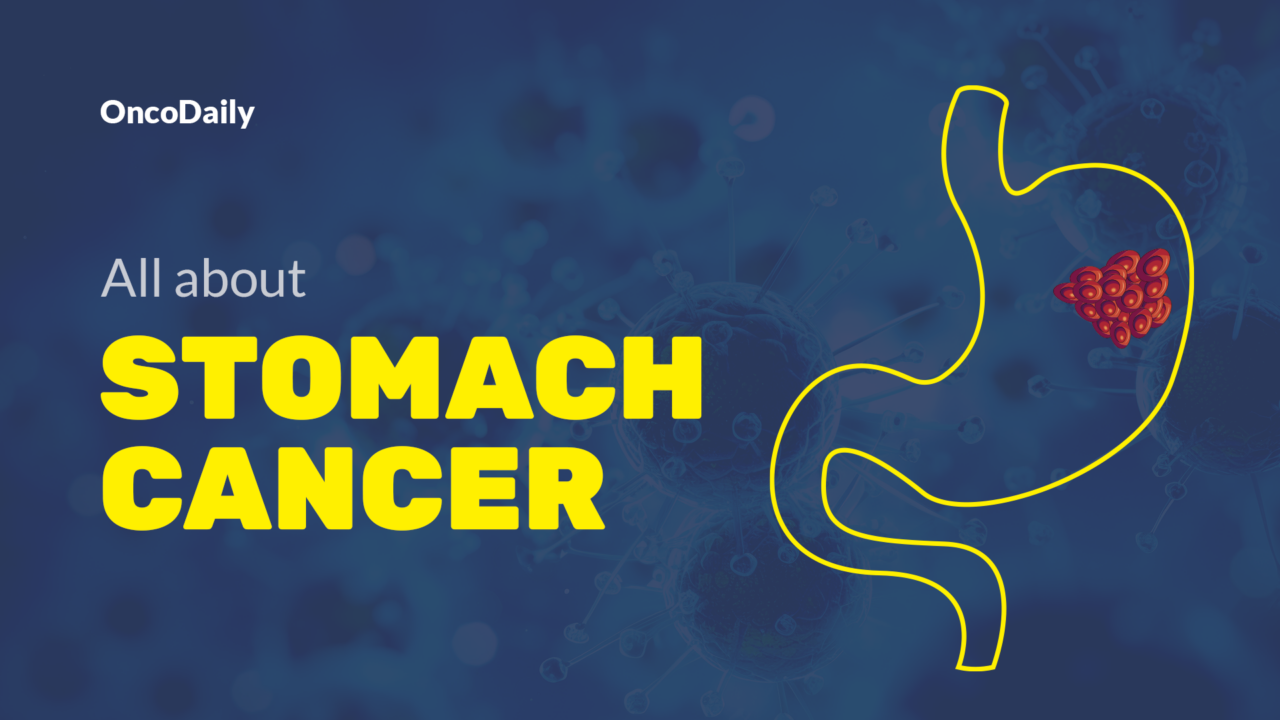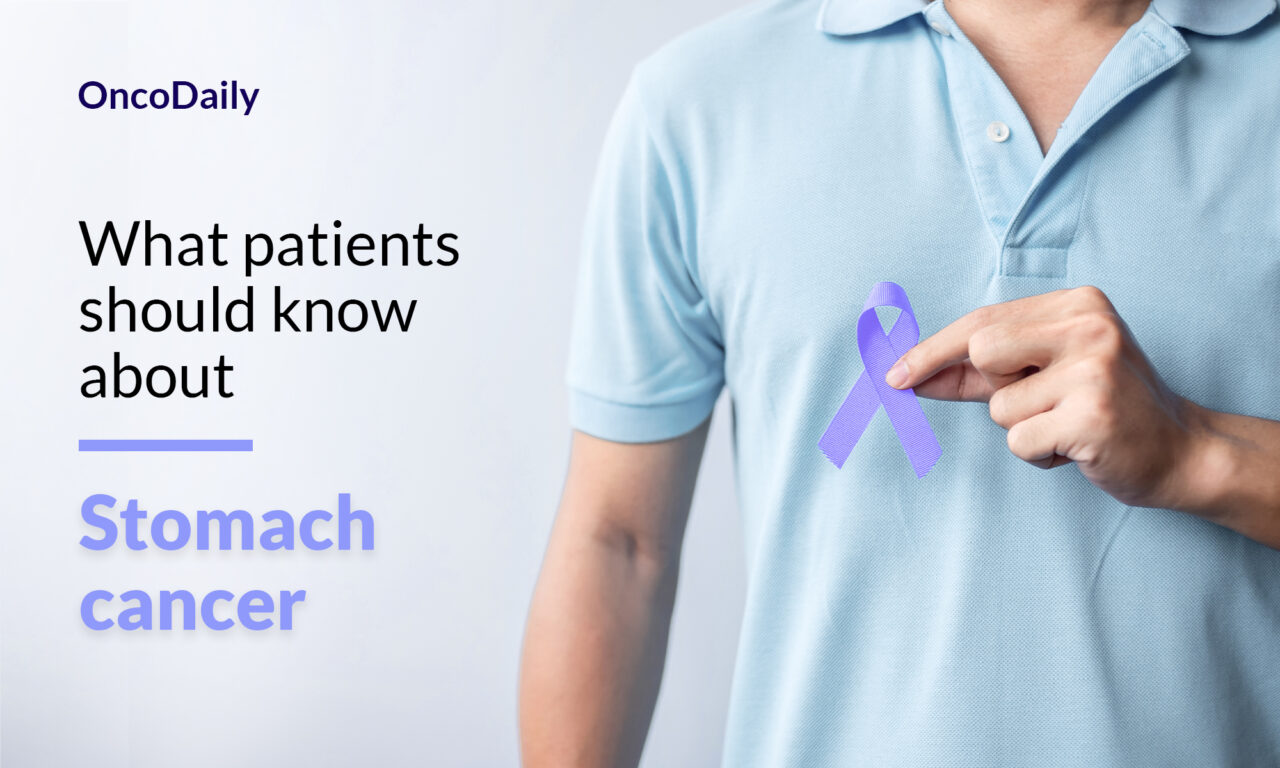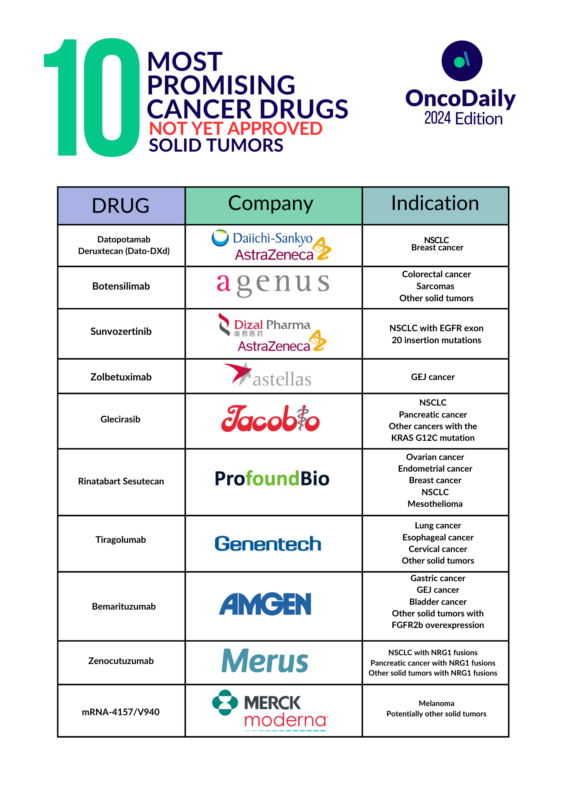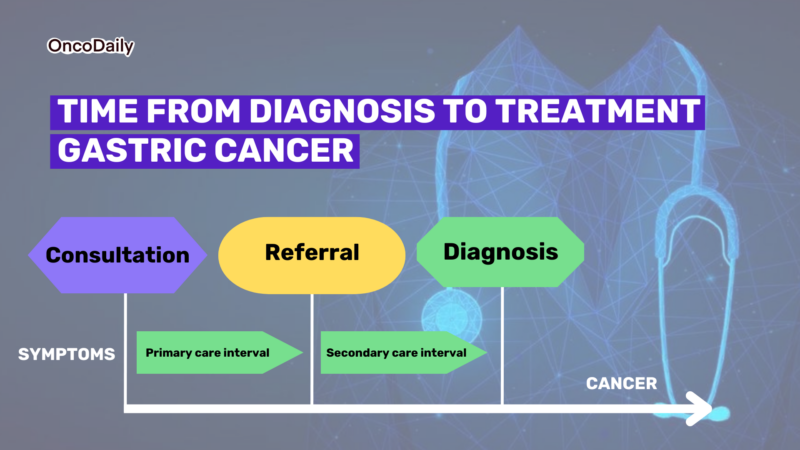
Stomach Cancer: Symptoms and Causes, Types, Diagnosis and Treatment
Stomach cancer, commonly referred to as gastric cancer, is a malignant condition originating from the stomach’s lining. It stands as a major global health concern due to its high mortality rate and the complexities involved in early detection. This type of cancer ranks as the fifth most prevalent cancer worldwide and is the fourth leading cause of cancer-related deaths, with over one million new cases and approximately 769,000 deaths annually.
Understanding its symptoms, causes, types, and diagnosis is essential for timely intervention. Key symptoms include persistent stomach pain, difficulty swallowing, unexplained weight loss, and nausea. The causes of Stomach cancer often involve factors like genetics, Helicobacter pylori infection, smoking, and dietary choices. There are several types of Stomach cancer, with adenocarcinoma being the most common. Diagnosis usually requires endoscopy, biopsy, and imaging tests to determine the presence and stage of the cancer. Understanding these aspects is essential for timely and effective treatment.
What Are the Symptoms of Stomach Cancer?
Stomach cancer often presents with non-specific symptoms, making early detection challenging. Common symptoms include:
- Persistent Indigestion: Patients may experience ongoing discomfort or a burning sensation in the stomach.
- Stomach Pain: Abdominal pain that does not resolve with typical treatments can be a warning sign.
- Nausea and Vomiting: These symptoms can occur frequently and may include vomiting blood in advanced stages.
- Weight Loss: Unexplained weight loss is a common symptom as the cancer progresses.
Real-life scenarios often involve patients initially attributing these symptoms to less severe conditions, such as gastritis or ulcers, delaying diagnosis. According to studies, these symptoms are prevalent in a significant number of Stomach cancer patients, underscoring the need for awareness and early medical consultation.

What Are the Early Signs of Stomach Cancer?
According to Layke J.C. et al’s study published in 2004 almost 80% of early Stomach cancer patients do not have any specific symptoms at presentation. Early signs of Stomach cancer can be subtle and easily overlooked. They may include:
- Feeling Full Quickly: Patients may feel satiated after eating only small amounts of food.
- Bloating: A sensation of fullness or swelling in the abdomen.
- Mild Indigestion: Initial indigestion that gradually worsens over time.
Early detection is crucial as it significantly improves the prognosis. Patients experiencing these symptoms should seek medical advice promptly to rule out Stomach cancer or initiate early intervention.
What are the Causes and Risk Factors for Stomach Cancer?
Stomach cancer is caused by the abnormal growth of cells in the stomach lining. The four most common risk factors contribute to its development include:
- Helicobacter pylori Infection: This bacterial infection is a major risk factor, leading to chronic inflammation and increased cancer risk. According to a study by Polk et al., published in Nature Reviews Oncology, approximately 75% of Stomach cancer cases are attributed to Helicobacter pylori infection.
- Smoking: Tobacco use significantly raises the likelihood of developing Stomach cancer.
- Genetic Predisposition: A family history of Stomach cancer can increase individual risk. According to Shah et al 2022 study, genetic causes contribute to less than 10% of all cases, and the rest are sporadic.
- Diet and Lifestyle: Consuming a diet high in salted, smoked, or pickled foods, along with obesity and alcohol consumption, are known contributors.
What Are the Types of Stomach Cancer?
Stomach cancer can be classified into several types, each with distinct characteristics:
- Adenocarcinoma: The most common type, originating from the mucus-producing cells of the stomach lining. According to the American Cancer Society adenocarcinoma accounts for over 90% of Stomach cancer cases.
- Lymphoma: A cancer of the immune system cells found in the stomach.
- Gastrointestinal Stromal Tumors (GIST): These arise from specialised nerve cells in the stomach wall.
- Carcinoid Tumors: Develop from hormone-producing cells and are a type of neuroendocrine tumor.
Adenocarcinoma
Adenocarcinoma is characterised by its gland-forming cells and can be further divided into intestinal and diffuse types. Symptoms often include abdominal pain and weight loss. Treatment typically involves surgery, chemotherapy, and targeted therapies, with survival rates varying based on stage and treatment efficacy.
Lymphoma
Stomach lymphoma presents with symptoms similar to other Stomach cancers, such as pain and nausea. Early diagnosis is crucial, and treatment options include chemotherapy and radiation therapy. Recent studies indicate varying survival rates, emphasizing the need for individualized treatment plans.
Gastrointestinal Stromal Tumors (GIST)
GISTs are rare and may present with bleeding or obstruction symptoms. Treatment often involves surgical resection and targeted therapies like imatinib. Long-term survival rates depend on tumor size and location.
Carcinoid Tumors
Carcinoid tumors are slow-growing and may not cause symptoms until advanced. Treatment includes surgery and hormone therapy, with research showing promising outcomes in recent years.
How Is Stomach Cancer Diagnosed?
Diagnosing Stomach cancer involves a combination of advanced imaging techniques, endoscopic procedures, and laboratory tests to ensure accurate detection and staging. Accurate diagnosis is crucial as it guides the treatment plan and significantly impacts patient outcomes, with early-stage Stomach cancer diagnosis leading to a 5-year survival rate of up to 70%, compared to less than 30% for late-stage diagnosis according to American Cancer Society data.
Additionally, treatment options vary greatly depending on the stage; early stages may involve curative surgery and adjuvant therapies, while advanced stages often may only require palliative care and/or combination treatments to manage symptoms and improve quality of life.
Diagnostic Procedures
- Imaging Tests: These include CT scans, MRI, and PET scans, which help visualize the stomach and surrounding tissues to assess the extent of the disease. CT scans are particularly useful for evaluating the spread of cancer to the lymph nodes and other organs.
- Endoscopy: Esophagogastroduodenoscopy (EGD) is a key diagnostic tool with an accuracy rate of around 70 – 80%, and up to 95% for some AI integrated novel tools (Zhang et al, 2024, Nature). It involves inserting a flexible tube with a camera to visualize the stomach lining and obtain biopsies for histopathological examination.
- Biopsies: Tissue samples obtained during endoscopy are analyzed to confirm the presence of cancer cells. This step is essential for an accurate diagnosis and determining the cancer type.
Lab Tests and Diagnosis for Stomach Cancer
Several laboratory tests complement imaging and endoscopic findings:
- Complete Blood Count (CBC): This test can identify anemia, which is common in Stomach cancer patients due to bleeding or nutritional deficiencies.
- Endoscopic Ultrasound (EUS): EUS provides detailed images of the stomach wall and nearby structures, helping in assessing tumor depth and lymph node involvement.
- Genetic Tests: These tests identify specific genetic mutations or markers, such as HER2, which can influence treatment decisions and predict response to targeted therapies.
What Are the Treatment Options for Stomach Cancer?
Treatment for Stomach cancer is multifaceted, often involving a combination of surgery, chemotherapy, radiation therapy, and emerging therapies like immunotherapy. Each treatment option has its specific role, effectiveness, and potential side effects.
Surgery
Surgical intervention is a cornerstone in Stomach cancer treatment, particularly for localized disease:
- Partial Gastrectomy: Involves removing part of the stomach affected by cancer. This procedure is typically used for tumors located in the lower part of the stomach.
- Total Gastrectomy: The entire stomach is removed, and the esophagus is connected to the small intestine. This is necessary for more extensive cancer spread.
- Lymph Node Removal: Often performed alongside gastrectomy to check for cancer spread, improving staging accuracy and treatment outcomes.
Chemotherapy
Chemotherapy uses drugs to kill cancer cells or stop them from dividing. It can be administered before surgery (neoadjuvant) to shrink tumors or after surgery (adjuvant) to eliminate residual cancer cells.
- Effectiveness: Chemotherapy has shown to improve survival rates, especially when combined with surgery.
- Side Effects: Common side effects include nausea, vomiting, and fatigue, which can impact quality of life.
Radiation Therapy
Radiation therapy uses high-energy rays to target and kill cancer cells. It is often used in conjunction with chemotherapy to enhance treatment efficacy.
- Recent Advancements: Techniques like intensity-modulated radiation therapy (IMRT) allow for more precise targeting, minimizing damage to surrounding healthy tissues.
Novel Agents and Targets: What is new in Stomach Cancer Treatment?
Immunotherapy
Recent progress in immunotherapy has shown promising results for Stomach cancer treatment. Immune checkpoint inhibitors (ICIs) such as pembrolizumab, avelumab, and sintilimab have been approved for clinical use in combination with targeted therapies. These agents work by activating the immune response to target cancer cells effectively. Additionally, novel targets like CTLA4, LAG3, and TIGIT are being explored to enhance the efficacy of immunotherapy, with promising results reported in major oncology congresses such as ASCO and ESMO.
Examples of Immunotherapy in Stomach Cancer
- Pembrolizumab: This PD-1 inhibitor has shown significant efficacy in treating metastatic Stomach cancer, particularly in patients with high PD-L1 expression. It is often used in combination with chemotherapy to improve outcomes.
- Nivolumab: Approved for use in advanced Stomach cancer, nivolumab has demonstrated improved survival rates when combined with chemotherapy, especially in patients with a PD-L1 combined positive score (CPS) of 5 or higher.
- Atezolizumab: As a PD-L1 inhibitor, atezolizumab is being evaluated in combination treatments to enhance the immune response in Stomach cancer patients.
- Tislelizumab: Currently under investigation, this PD-1 antibody is being tested in combination with chemotherapy and has shown promising results in improving survival rates.
- Novel Combinations: The combination of Balstilimab (anti-PD-1) and Botensilimab (anti-CTLA-4) with chemotherapy is being explored for its potential to enhance treatment outcomes in Stomach cancer.
Targeted Therapy
Advances in targeted therapy have focused on agents like trastuzumab and ramucirumab, which target specific molecular pathways involved in Stomach cancer progression. Novel anti-HER2 agents such as trastuzumab deruxtecan (T-DXd) and disitamab vedotin (RC48) have shown substantial breakthroughs in treatment efficacy.
HER2-Positive Advances
- Trastuzumab Deruxtecan (T-DXd): This antibody-drug conjugate (ADC) is showing significant promise in HER2-positive Stomach cancers by affecting tumor cells and their microenvironment. It has demonstrated improved survival outcomes in clinical trials, particularly for patients with advanced disease.
- Disitamab Vedotin (RC48): Another promising ADC, Disitamab Vedotin has demonstrated effective anti-tumor activity even in Stomach cancers with low HER2 expression, expanding treatment options for this subset of patients.
Anti-VEGF Innovations
- Ramucirumab: A well-established VEGFR2 antagonist, Ramucirumab is often combined with chemotherapy to enhance outcomes in metastatic Stomach cancer settings.
- Bevacizumab: Although explored in various combinations, Bevacizumab has shown mixed results in Stomach cancer, indicating the need for further research to optimize its use.
Novel Molecular Targets
- Claudin 18.2: Targeted by zolbetuximab, this emerging molecular target has shown improved outcomes in patients with CLDN18.2-positive tumors, representing a promising new avenue for treatment.
- FGFR Inhibitors: Agents such as bemarituzumab and futibatinib are targeting FGFR alterations with positive early results in clinical trials, offering potential new therapies for Stomach cancer patients.
Molecular Biomarkers
The classification of Stomach cancer based on molecular biomarkers, including PD-L1, microsatellite instability (MSI), and HER2, has enabled the development of personalized treatment strategies. These biomarkers help identify patients who may benefit from specific immunotherapy or targeted therapy approaches.
Novel Therapies in Stomach Cancer
Clinical trials are investigating novel agents targeting various molecular pathways, such as c-MET and FGFR inhibitors, mTOR pathway inhibitors, iNKT cell-based therapy and CAR-T cell therapy. These trials aim to improve survival rates and treatment outcomes by addressing the molecular heterogeneity of Stomach tumours.

Read more on the Top 10 Most Promising Novel Drugs in 2024
What Are the Stages of Stomach Cancer?
Stomach cancer staging is crucial for determining the appropriate treatment strategy and prognosis. Each stage represents the cancer’s progression, influencing survival rates and treatment options.

Stage 0 Stomach Cancer (Carcinoma in Situ)
- Overview: At Stage 0, Stomach cancer is confined to the innermost lining of the stomach (mucosa). This is often referred to as carcinoma in situ and is the earliest stage of Stomach cancer.
- Symptoms and Diagnosis: At this stage, symptoms are usually absent or minimal, which is why early detection is often challenging. Diagnosis typically involves endoscopy and biopsy, detecting abnormal cells in the stomach lining.
- Treatment and Prognosis: Surgical removal of the affected tissue (endoscopic resection) is often the primary treatment. The 5-year survival rate for Stage 0 Stomach cancer is approximately 90% according to the American Cancer Society, reflecting the high likelihood of successful treatment when detected early.
Stage I Stomach Cancer
- Overview: In Stage I, cancer has spread into the submucosa, the layer of tissue beneath the mucosa, and may involve nearby lymph nodes.
- Symptoms and Diagnosis: Symptoms may start to appear, such as indigestion, stomach pain, or mild nausea. Diagnosis at this stage often involves endoscopy, biopsy, and imaging tests like CT scans.
- Treatment and Prognosis: Treatment for Stage I Stomach Cancer usually includes surgery to remove part of the stomach (subtotal gastrectomy) and possibly surrounding lymph nodes. The 5-year survival rate for Stage I Stomach cancer ranges from 60% to 80% depending on the extent of lymph node involvement according to the National Cancer Institute.
Stage II Stomach Cancer
- Overview: Stage II Stomach cancer involves deeper invasion into the muscularis propria, the muscle layer of the stomach, and more extensive lymph node involvement.
- Symptoms and Diagnosis: Symptoms are more pronounced and may include weight loss, abdominal pain, and vomiting. Diagnostic methods include endoscopy, biopsy, CT scans, and possibly PET scans to assess the spread.
- Treatment and Prognosis: Treatment typically involves a combination of surgery (total gastrectomy), chemotherapy, and sometimes radiation therapy. The 5-year survival rate for Stage II Stomach cancer is approximately 30% to 50%, with the prognosis declining as lymph node involvement increases based on the data of the American Cancer Society.
Stage III Stomach Cancer
- Overview: In Stage III, Stomach cancer has spread extensively to nearby structures (such as the pancreas or spleen) and involves a significant number of lymph nodes.
- Symptoms and Diagnosis: Patients often experience severe symptoms, including persistent stomach pain, vomiting, and difficulty swallowing. Diagnostic methods include advanced imaging techniques like CT, MRI, and PET scans, along with a biopsy.
- Treatment and Prognosis: Treatment for Stage III Stomach Cancer generally involves surgery, if possible, combined with chemotherapy and/or radiation therapy. The 5-year survival rate for Stage III Stomach cancer is approximately 10% to 30%, reflecting the advanced nature of the disease according to the National Cancer Institute.
Stage IV Stomach Cancer (Metastatic)
- Overview: Stage IV Stomach cancer is the most advanced, with metastasis to distant organs such as the liver, lungs, or bones.
- Symptoms and Diagnosis: Symptoms are often severe and widespread, including jaundice, bone pain, and significant weight loss. Diagnosis involves a combination of imaging tests (CT, PET scans) and biopsies to confirm metastatic spread.
- Treatment and Prognosis: Treatment at this stage focuses on palliative care to relieve symptoms and improve quality of life. Options may include chemotherapy, targeted therapy, and immunotherapy. The 5-year survival rate for Stage IV Stomach cancer is less than 5%, with most patients surviving less than a year after diagnosis according to the American Cancer Society.
How Is Stomach Cancer Prognosis Determined?
Prognosis depends on several factors:
- Cancer Stage: Early-stage cancers have a better prognosis compared to advanced stages.
- Patient Health: Overall health and comorbidities can influence treatment tolerance and outcomes.
- Treatment Response: The effectiveness of initial treatments plays a critical role in long-term survival.
What Is the Survival Rate for Stomach Cancer?
Survival rates vary significantly based on the cancer stage at diagnosis. According to the National Cancer Institute, the 5-year relative survival rates are as follows:
- Localized Stomach Cancer (Stage I and Stage II without nodal involvement): Approximately 75% 5-year survival rate.
- Regional Stomach Cancer (Stage II with nodal involvement and Stage III): Drops to around 35%.
- Metastatic Stomach Cancer (Stage IV): The 5-year survival rate is about 7%.
Recent advancements in Stomach cancer treatment and early detection, such as the development of novel therapeutic agents and high-quality diagnostic tools, are gradually improving survival rates and offering hope for better outcomes.
How Long Does It Take to Notice and Cure Stomach Cancer?
The timeline from noticing symptoms of Stomach cancer to diagnosis and treatment can vary significantly based on several factors, including the type of Stomach cancer and the healthcare system’s efficiency. On average, the diagnostic interval is about 44 days, but this can be longer if Stomach cancer symptoms are not immediately recognized or if there are delays in accessing healthcare. Early-stage Stomach cancers, when detected, can be treated more effectively, often involving surgery and possibly chemotherapy or radiation therapy, with treatment duration varying based on individual cases.

How to Live with Stomach Cancer?
Living with Stomach cancer involves managing both physical and emotional challenges. Here are some strategies:
- Coping Strategies: Patients often use internal coping mechanisms, such as maintaining a positive outlook and seeking spiritual support, to manage pain and stress.
- Support Systems: Engaging with support groups can provide emotional and practical support. Organizations like Hope For Stomach Cancer offer both virtual meetings and in-person support.
- Dietary Adjustments: Patients are advised to eat smaller, more frequent meals and avoid certain foods that can exacerbate symptoms. A diet rich in vegetables, fruits, and whole grains is recommended, while processed foods, high-fiber foods, and irritants like alcohol and caffeine should be limited
After Treatment: What to Expect
After completing treatment, patients often face a range of side effects and lifestyle changes that require careful management. Common post-treatment issues include digestive changes and potential nutritional deficiencies, particularly after surgeries like gastrectomy. Some aspects to consider after treatment:
- Side Effects: Common post-treatment issues include changes in digestion and potential nutritional deficiencies, especially after surgeries like gastrectomy.
- Monitoring: Regular follow-up appointments are crucial to monitor for recurrence and manage any ongoing side effects. These typically occur every 3 to 6 months initially.
- Lifestyle Adjustments: Patients might need to incorporate dietary supplements and adjust their eating habits to maintain nutrition and manage symptoms like dumping syndrome.
Can Stomach Cancer Be Prevented?
While not all cases of Stomach cancer can be prevented, certain measures can reduce risk:
- Diet Modifications: Consuming a diet rich in fruits and vegetables and low in salt-preserved foods can lower risk.
- Avoiding Smoking: Smoking cessation is a significant preventive measure.
- Regular Screenings: Especially important for high-risk individuals, regular screenings can lead to early detection and improved outcomes.
Regular Screenings
Regular screenings, such as endoscopies, are vital for early detection. Studies suggest that a 2-year interval is optimal for Stomach cancer screenings, particularly in high-risk populations.
Lifestyle and Dietary Changes
Adopting a healthy lifestyle, including maintaining a normal weight and reducing alcohol consumption, can significantly decrease Stomach cancer risk.

The Stomach Cancer Diet And Cookbook: The Essential Guide | Easy, Tasty and Quick Recipes to Satisfy Anyone Includes Flexible Meal Plan : Audrey RND, Lucy: Book can be purchased in Amazon
FAQs
Is Stomach Cancer Hereditary?
Not necessarily, but Stomach cancer can have hereditary components, especially in cases involving genetic mutations like those in the CDH1 gene. A family history of Stomach cancer can increase individual risk. It’s advisable to discuss this with your healthcare provider, who may recommend regular screenings.
Can a Helicobacter pylori infection lead to Stomach cancer?
Yes, Helicobacter pylori infection is a significant risk factor for Stomach cancer. Chronic infection with this bacterium can cause long-term inflammation of the stomach lining, which can eventually lead to changes in the cells and increase the risk of developing Stomach cancer.
How Often Should One Get Screened for Stomach Cancer?
Screening frequency depends on individual risk factors. For those at high risk, such as individuals with a family history of Stomach cancer, screenings every two years are recommended.
What are the early symptoms of Stomach cancer that I should look out for?
Early symptoms of Stomach cancer can be vague and easily mistaken for other conditions. They may include persistent indigestion, stomach discomfort, feeling full quickly after eating, mild nausea, and unintended weight loss.
Can diet and lifestyle changes reduce the risk of Stomach cancer?
Yes, certain dietary and lifestyle changes can lower your risk of developing Stomach cancer and also alleviate the symptoms. A diet rich in fruits and vegetables, avoiding smoked and salty foods, quitting smoking, and reducing alcohol consumption are all beneficial preventive measures.
Can Stomach Cancer Be Cured?
Yes, Stomach cancer can be cured, especially if it is detected at an early stage. The likelihood of a cure decreases as the cancer progresses to more advanced stages. The 5-year survival for localized Stage I and Stage II Stomach cancer is up to 75%, while for metastatic disease it is only 5%.
What are the most common treatments for early-stage Stomach cancer?
Early-stage Stomach cancer is usually treated with surgery, such as partial or total gastrectomy, and possibly adjuvant chemotherapy. Early detection significantly increases the chances of successful treatment.
Can Stomach Cancer Treatment Be Without Chemotherapy?
Yes, Stomach cancer treatment can sometimes proceed without chemotherapy, particularly in early-stage cases where surgery alone may be sufficient. For localized tumors, surgical resection might be the primary treatment method. However, in more advanced stages, chemotherapy is often recommended to shrink tumors before surgery or to eliminate remaining cancer cells after surgery. The treatment plan depends on the cancer’s stage, location, and the patient’s overall health.
Can a Stomach emptying scan show cancer?
While it is not designed to detect cancer, it can sometimes reveal abnormalities in stomach function that might prompt further investigation. A Stomach emptying scan is primarily used to evaluate how quickly food leaves the stomach, usually to diagnose conditions like gastroparesis.
Can Stomach ulcers turn into cancer?
Stomach ulcers themselves do not become cancerous, but the underlying causes, such as chronic Helicobacter pylori infection, can increase the risk of developing Stomach cancer. Regular monitoring and treatment of ulcers are essential to reduce this risk.
What Novel Treatments Are Available for Stomach Cancer?
New agent development is focusing on targeted therapies and immunotherapies that specifically attack cancer cells with minimal impact on healthy tissue. Emerging therapies include antibody-drug conjugates that deliver cytotoxic drugs directly to cancer cells, immune checkpoint inhibitors that help the immune system recognize and fight cancer, and combination therapies that integrate different treatment modalities to enhance efficacy and fight against Stomach cancer.
Can I participate in a clinical trial for Stomach cancer treatment, and where can I find information about ongoing trials?
Yes, participating in a clinical trial can provide access to new and emerging treatments for Stomach cancer that are not yet widely available. You can find information about ongoing clinical trials through resources like ClinicalTrials.gov, which is a database of privately and publicly funded clinical studies conducted around the world. Additionally, you can ask your oncologist or healthcare provider about trials that may be suitable for your specific condition.
-
Challenging the Status Quo in Colorectal Cancer 2024
December 6-8, 2024
-
ESMO 2024 Congress
September 13-17, 2024
-
ASCO Annual Meeting
May 30 - June 4, 2024
-
Yvonne Award 2024
May 31, 2024
-
OncoThon 2024, Online
Feb. 15, 2024
-
Global Summit on War & Cancer 2023, Online
Dec. 14-16, 2023
